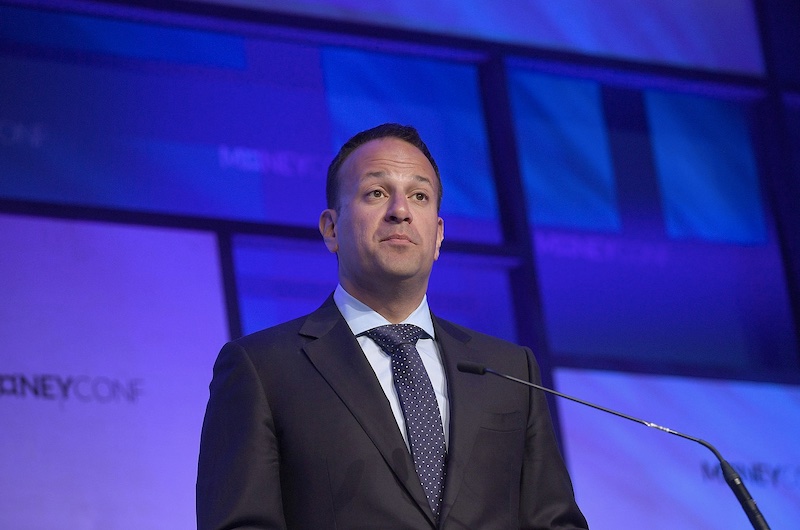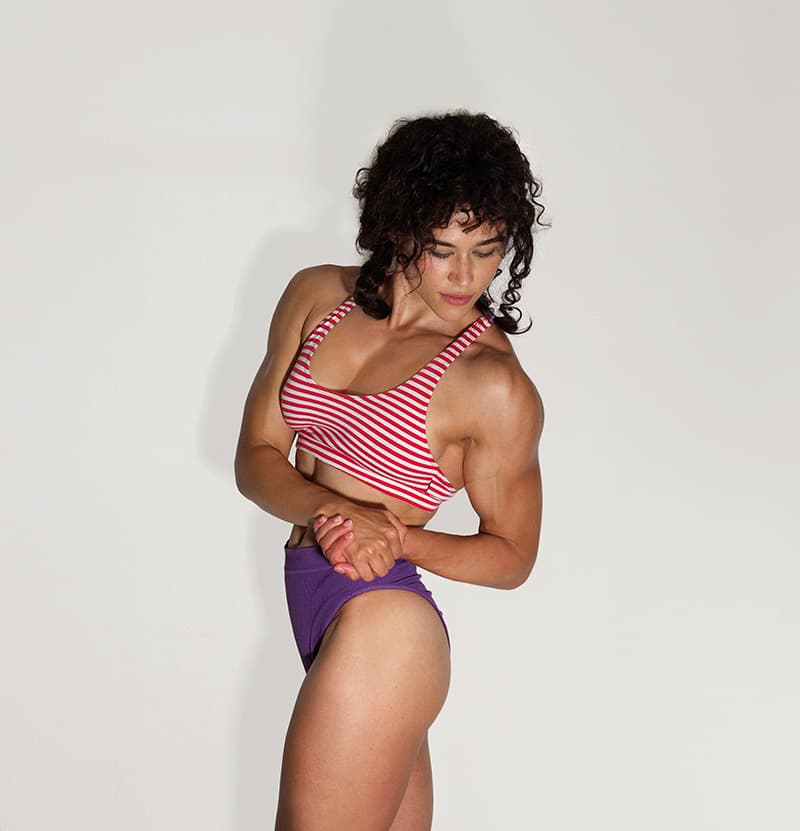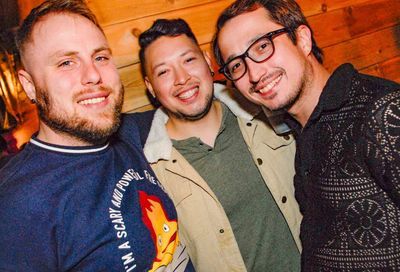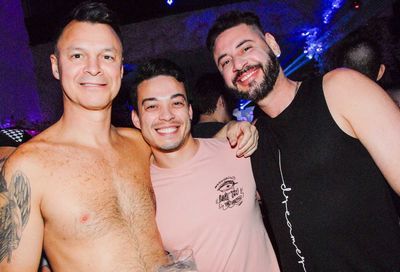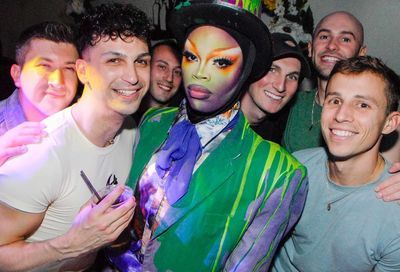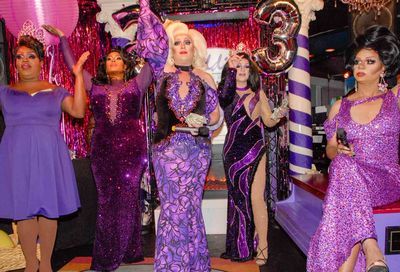Reaching the Summit
NBJC's H. Alexander Robinson and Donna Payne on their group's leadership summit, the African-American GLBT community's socio-political reality, and the MMM commemoration
In December 2003, a handful of leaders from the GLBT African-American community banded together to challenge support from African American religious and civil rights leaders for Republican-led efforts to amend the Constitution to prohibit same-sex marriage. Instead, this new group began raising money to place ads promoting marriage equality in the African American media.
Today, nearly two years later, the National Black Justice Coalition stands as the only national organization dedicated primarily to equality for gay African Americans. Two of the D.C.-based organization’s board members call the metro area home: H. Alexander Robinson, NBJC executive director and CEO, and Donna Payne, NBJC vice president.
Civil rights issues come easy to Payne, who works fulltime as the Human Rights Campaign’s senior constituency organizer. She was, in a manner of speaking, born into the movement. ”On top of being a minister, my father was involved politically in Nashville,” says Payne, a Tennessee native. ”My mother was active also. She was part of working with Dr. King’s nonviolence movement…. I was sitting on her shoulders on the night before [King] was killed. We were all together at the church service. I still remember his voice. I was five.”
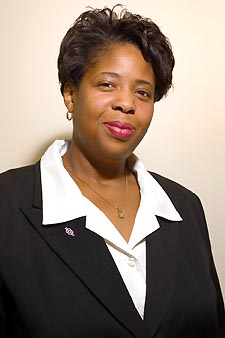 Donna Payne |
Though coming out in her 20s caused some friction with her mother — her father, who did much to spark Payne’s sense of social justice, died years earlier — the two are very close today. ”She comes up here a lot,” says Payne. ”She’s proud [of me], but she did go through a huge amount of learning. She was not proud at first. That was a six-year journey.”
Robinson’s own journey — which includes a wife and child, and an MBA from Stanford University — led him to San Francisco in the late ’70s and a reckoning with his sexual orientation and political awareness.
”It blew my mind,” he says. ”I was totally taken aback by the whole experience…. It wasn’t until I moved to San Francisco that I actually knew that there was anything like partnered gay men. I’d always had sort of an interest in politics, but living in San Francisco during the beginning of the [AIDS] epidemic, I really became engaged.”
This week, both Payne and Robinson will experience a notable step on their respective political journeys as the NBJC hosts its first Black LGBT Community Leaders Summit, which began yesterday, Sept. 21 and runs through Friday, Sept. 23. Despite the demands of preparing for the summit, as well as the demands of their regular duties — it was impossible to sit down with both at the same time as an appointment with Kweisi Mfume had Robinson on the road, while Payne had to head to Detroit for an HRC ”Gospel & Soul” event — each did manage to find time last week to speak with Metro Weekly. While interviewed separately, their answers have been formatted to read as a single interview.
METRO WEEKLY: NBJC is hosting its first Black LGBT Community Leaders Summit. This coincides with the Congressional Black Caucus Foundation’s 35th annual conference, also held in D.C. How will these two meetings mesh?
DONNA PAYNE: They complement each other. At the Congressional Black Caucus Foundation meeting, they have ”braintrusts” that go on all day. You can hit some and leave. The overall idea was to bring us where all of the Congressional black leaders are, to be a part of that. Where in the U.S. could you get all of it at one time and hit everybody and be within two blocks of one another?
We’ve got about 150 registrants. They’re leaders in different cities and states. They’re all doing their work in a local way. But we need to connect them together. The whole idea is to bring them together in a national way so that we know each other and can network. People are excited.
H. ALEXANDER ROBINSON: We’ve made efforts in the past to build relationships with the Congressional Black Caucus. But it’s like any other caucus: It’s made up of individual members who have very different political agendas. We have relationships that are good, bad, better. Dealing directly with gay and lesbian issues has been a challenge.
Generally, the caucus has been very good on being willing to address HIV and AIDS. They’ve been very supportive when it comes to their voting records. But addressing homophobia outside of the AIDS context has been a challenge.
It’s true there are some scheduling conflicts, but it’s also true that I’ve been to the Congressional Black Caucus [Foundation] legislative weekend for the past five years, and there are a half dozen openly gay people who attend. It’s not as if the 130 people who have signed up so far [for the Summit] were going to be over at the CBCF. They just weren’t going to be present. This is, at least, an opportunity to walk just a couple blocks up the street and you can go in and talk and associate and rub shoulders [at the conference].
While the Congressional Black Caucus is certainly addressing issues important to the whole community, if your primary political activism or focus is centered around LGBT rights and issues, that’s not really there [at the Foundation].
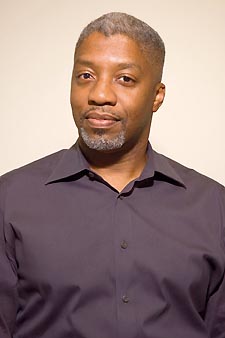 H. Alexander Robinson |
MW: What are the goals for the summit?
ROBINSON: It’s been a challenge to speak with any authority and to say this is the voice, these are the concerns being raised by the community, because we haven’t been organized in a way to have that discussion.
One of the reasons why I pushed to have the summit is because as I’d gotten back into the game, going to [NGLTF’s] Creating Change and similar events, folks were getting together and planning a political agenda. That was not happening for black gay and lesbian folks. There were one or two of us — let me be generous and say the same dozen of us — who were having this discussion. A broader agenda was not being developed.
One of the primary purposes of the summit is to sort of take our inchoate conversations about what our agenda is and really begin to lay that out in front of some of the black gay and lesbian leadership and ask, ”Does this work? Does this fit with what you’re hearing in your local community?” If it does, then what are the strategies for us advancing some of these issues within the context of African-American organizations like the NAACP, the Leadership Conference on Civil Rights, the Southern Christian Leadership Forum, the CBCF. If they were to give us a plenary session, what would we say? That’s part of the agenda.
There is another piece I’m hoping for. None of the statewide LGBT organizations are diverse. None of them. I think there may be three people in the Equality Federation who are African American. My goal is to have more black gay and lesbian folks see careers in this field as a positive thing, to encourage people to run for office, and to lift up those people who are already doing it.
There were so many things an event like this could’ve been. It’s designed to end up where it ends up. We will bring these people together. We will provide some structure and information exchange. And we’re going to use the information that comes out of this. It’s really an effort to inform the NBJC, because we’re in the process of writing a five-year plan.
PAYNE: Visibility is a big piece. There are times when I’ve spoken to Congressional Black Caucus members and they’ve said, ”Where is the black GLBT community? We don’t know where they are.” My attitude as an African American was, ”They’re here. They’re everywhere.” But they didn’t see them in their offices. They didn’t see them lobbying. The fact that they’ll know we’re here in the city, that we have a whole slew of meetings going on, that they can participate. [Massachusetts state Rep.] Byron Rushing, will be on a panel. We’ve got Congresswoman Gwendolyn Moore from Wisconsin. That they see us and participate, that’s a big piece.
MW: How would you outline the NBJC’s achievements since forming in December 2003?
PAYNE: I will be honest, because I think people should understand what it takes to actually create an organization. Accomplishments have been to set up bylaws for the organization; to actually have an office; to have computers so we can build our infrastructure and database, our Web site. Those are big things. I think some people may laugh at that, but those are the baby steps of birthing an organization. It’s making sure the phones stay on and the Web site stays up.
ROBINSON: We’ve developed plans, gone to the conventions. We’ve been out there. The summit is the next step. In February [2005], after being around for more than a year, the board said, ”Okay, we’re going to be real. We’re actually going to be an ongoing concern. We’re going to develop a full agenda.” Yes, marriage is still a priority for the organization, but we’re going to develop a full policy agenda. We’re going to develop a five-year plan. We’re going to expand the board so that we ensure longtime viability. We adopted a new mission statement that was broader. The organization made a commitment to being sustainable, to being in this for the long haul.
NBJC is a creation of necessity. We were confronted with an urgent need. There were all of these ballot initiatives. There was organizing in black communities, but there was no authentic black gay perspective being presented. So NBJC came into being, and we did what we did. We continue to evolve.
MW: Looking ahead to Oct. 15 and the Millions More Movement (MMM) 10-year commemoration of the Million Man March, how are things looking today? Your dialogue with Minister Louis Farrakhan, organizer of the event, seems to evolve weekly. Meanwhile, the wound caused by homophobic comments from the Rev. Willie Wilson, national executive director of the MMM commemoration, has yet to heal. All that seems certain is that NBJC has reserved Freedom Plaza to coincide with MMM events on National Mall.
PAYNE: One thing is for sure: We’re having a rally. We’re looking at it as a celebration no matter what. The celebration is that we are family — that is the theme. The whole message we’re trying to send is that whether or not we’re down there on the Mall, your whole family is here. We may be at Freedom Plaza, but we are part of your family. Perhaps we haven’t been invited to eat the barbeque, but we’re going to have potato salad. [Laughs.]
ROBINSON: There are some black gay and lesbian folks who are saying, ”Why are you begging these people to be a part of their thing? If they made it clear that they don’t want you, then you should just go away.”
My thing about that is, I’m not going to go away because we’ve always been there, and we’re going to continue to be there. We used to be there in silence, but we’re not going to suffer in silence anymore. If this is a movement about lifting up black Americans, then it’s a movement about me, and I’m going to insist on being there. Certainly, if there are openly gay and lesbian speakers on the platform, the mood will be a lot more affirming.
[Louis Farrakhan] is a master communicator. He has continued to communicate that [the MMM] is inclusive. By all reports, he has done that when he knows we’re in the room, and [when we are] not. That said, we’re not on the [MMM] executive committee. We’ve asked to address the executive committee. He did not say no to that, but he never said yes. And we don’t have a speaker on the platform yet. There is still an opportunity for his actions to match his rhetoric. But so far, the rhetoric has been at least better than it’s been [in the past]. It hasn’t been all the way there, but it’s certainly been better than some of the homophobic rhetoric we’ve heard from his associates in the past.
MW: Speaking of homophobic rhetoric, what role has Rev. Wilson played in steeling the resolve of the African-American GLBT community in regard to the MMM commemoration?
ROBINSON: I think we were there before Wilson. [His comments] certainly provided a lot more energy to the effort. People who might not have been paying attention to what we were saying about organizing, suddenly started paying attention because there was controversy. I certainly see it as being a catalyst for increased activity, but we would’ve been organizing anyway. It was always the intent to have some sort of pre-event gathering.
We’ve said that we want all of our lesbian and gay friends to come out and support us. This is being led by black gay and lesbian folks, but we want all our allies to come out and show their support. I don’t think we necessarily would’ve expanded in that way had it not been for the incident with Rev. Wilson.
PAYNE: [Wilson] abandoned his true self. He abandoned who he really was. The minister who we had known was very understanding and very caring. We don’t know what happened to him. We worry about him.
We understand our culture of how ministers have treated GLBT people in the church. What they have said is, ”We love you. God loves you. But God don’t like this.”
What we’re saying is, ”No, we’re accepted and loved no matter what.” That’s the disconnect. In our culture, there has been this unsaid part, that you don’t talk about what you do — ”your biz-ness,” so to speak. You come to church and you’re part of the community, but don’t talk about sex. We’re saying that all of this is us. They don’t want to get that. But it’s out. We’re telling them that last piece needs to be public.
MW: Turning to religion, nearly every religious creed has a gay following of some sort. Still, it’s fair to say that the GLBT community has a strained relationship with organized religion. This strain is also reflected within the African-American GLBT community. Nevertheless, this community seems to hold all the more tightly to its religious institutions — moreso than the GLBT community as a whole. Why is that?
PAYNE: As an African American, when you begin to grow up and face the world, you recognize a couple of things. You recognize that only by the grace of God are you really going to be able to make it, because society is telling you that you’re ugly. Society tells you your face doesn’t belong on these magazines. Society tells you when you’re walking down the street that you are nothing, that you can be hit and kicked and the police may not show up. Your life is inundated most of the time with a lot of painful experiences from society, period.
You need something, and it has to be bigger than a human being. You need God. At the end of the day, the only person, the only being you can really depend on would be Jesus, God. Grace is the only way you’re going to make it. You need Allah, God, Buddha.
[With organized religion], we’re at a turning point. We can accept who we are and push others in the religious community to accept who we are. Or we can sit down and be ashamed and continue to be silent. But our silence is going to kill us. We really don’t have an option. It’s painful to walk this road, but we’re walking it. We want to live healthy, normal lives.
ROBINSON: It would be interesting to actually know what the reality is. But what’s being observed is that the people we see are the people who are politically and socially engaged in the issues. And the relationship between African-American racial justice and the church has been there for quite some time. It became particularly acute during the civil rights movement and the rise of Dr. Martin Luther King Jr. So it’s not surprising that the people you see who are active and engaged are also very religious.
The interesting thing is that if you attend an NAACP or Urban League meeting, everything begins and ends with a prayer. That strong, church-based, religious-based, primarily Christian — but not exclusively — strand runs throughout. Which, quite frankly, is lacking in gay organizing.
I went to a gay meeting on marriage and religion, and I suggested that we open with a prayer because [the first openly gay bishop in the Episcopal Church] Eugene Robinson was sitting at the head table. We should open with a prayer. There was a lot of resistance and angst in the room. I think it’s because so many of us, so many gay and lesbian people have been so hurt by organized religion. Many of us have reconciled that in different ways, from going to affirming churches, to abandoning organized religion. Many in our community come out of a political philosophy that sort of sees organized religion as the enemy.
That’s sometimes one of the reasons why you find lots of black gay and lesbian folks separating themselves from what we would commonly define as the ”gay community.” They don’t find spirituality there. When that’s missing for them, there is a missing piece of the puzzle.
MW: On a national scale, we’re seeing another community split of sorts. Polling in the wake of Hurricane Katrina shows that perceptions about the role of race and class in the disaster differ wildly between black Americans and white Americans. Does this split also exist within the nation’s GLBT community?
ROBINSON: On gay issues, you do have the perception, and often the reality, that the agenda — to the extent that there is a ”gay agenda” — is being set by white men. Like everything else. That continues often to be affirmed.
When you go to an event and the topic of the session is the gay and lesbian agenda and the panel is all white men, what is one to take from that? There was one event I attended this year where that was the case. It was the case, to be fair to the organizers of the event, because they selected the executive directors of all the larger national gay and lesbian organizations. It wasn’t diverse because that pool of individuals isn’t diverse.
But why is that? Why is it in 2005 there has yet to be a person of color — let’s not even say ”person of color” — yet to be an African American to head any of the organizations? Or to even be the second in any of those organizations? It can’t be because there is no one qualified out there who wants to do the job. It isn’t that all the people involved in the organizations are racist. We operate in a society where there are donors and an inside track. There are a whole bunch of people who are just not going to be in those groups. There are a disproportionate number from Massachusetts also. I don’t know what that’s about either. [Laughs.] As my friend from New York would say, that’s a whole other workshop.
PAYNE: That split does show up. There are times when our white brothers and sisters in the GLBT community may not even totally understand what we face. Because of privilege, of carrying white skin, they may not even have any experience to pull from. That can lead to not being sensitive. You do see that. You do see it less [in the GLBT community] because there is an understanding of what discrimination looks like. But I don’t think the total of what discrimination feels like has ever been felt.
There are two communities, but I still believe overall that they can exist with each other. That’s why I do the work that I do at the Human Rights Campaign, as well as at the National Black Justice Coalition. I feel there is a need to always have a bridge. I believe that it can work.
MW: Other racial/ethic groups like the National Black Gay & Lesbian Leadership Forum and LLEGO had similar missions to NBJC, but collapsed for financial reasons. What can you say to allay fears that NBJC may suffer that same fate?
PAYNE: Everyone has noted the need to have an African-American premier organization. There was a hollow voice when we lost the National Black Gay & Lesbian Leadership Forum some years ago. That was one of the saddest days for me.
We’ve learned a lot from the loss of the Forum and the loss of LLEGO. We’ve seen a lot of painful lessons about building boards, building a solid fundraising capacity. Some of the things that are big don’t look glitzy, but it’s infrastructure.
Money issues are good right now. We’re in an economic time when it is hard to raise a dollar. But because of our unique status and an understanding of why we are needed, we are building on the fundraising. Alexander has been excellent at pinpointing what’s needed. He has a history of understanding financial needs.
ROBINSON: One of the things that’s different this time around is that there are people with resources — including the Gill Foundation and the folks at [the Evelyn and Walter Haas Jr. Fund] — who have made a commitment to helping this organization be viable. They made a multi-year commitment to do that. This is not something that I think any other organization has had before.
I also think the board understands that we have work to do in the community, because part of our natural constituency does not have a history of giving to organizations like this one. Or they have had a bad experience giving to organizations like this one. We have something to prove. We’re aware of that and we have plans to address that. The final thing I would say is roll up your sleeves and make sure that doesn’t happen.
Many of us understand what happened to organizations in the past. There are some obvious mistakes around government funding. We’ve decided we’re clearly going to stay away from that. It looks good, it feels good, but it goes away very quickly.
MW: Finally, how would you respond to those who would argue that the large, mainstream GLBT groups adequately represent racial and ethnic minorities in the community? What is the justification for dedicating limited GLBT resources to the NBJC?
PAYNE: We’re needed to be visible. We’re needed to be seen within the arena of all our other allies. Who better to answer an African-American mainstream ally — or a person who is not good on our issues — but another African American? You can’t replace that. You can’t substitute it.
There’s not as much diversity in the GLBT community as we would hope to see. I’m not quite sure why that is. What I do know is that it’s needed, because we’re at a turning point. Black folks are coming out across the country. They’re coming out with their babies and partners. And they’re speaking up.
ROBINSON: We have African American gay and lesbian people who want to contribute to gay and lesbian issues. And they want to do it through a black group because that’s where they feel the most comfortable. There should be a place for them.
There are African American organizations who are supportive of gay issues, and they would like to work with another black organization on gay issues. They don’t dislike the Task Force. They don’t dislike the people at the Victory Fund. But if there was a black group for them to work with, they would prefer it. This is one of us, coming to talk to one of us about this issue. This isn’t someone from outside our community coming into our community to talk to us.
We need an NBJC, or we need a Latino group, for the same reason we need a women’s organization, and we need a transgender organization. It’s the same reason we need Democrats, Republicans and the Green Party. Through the diversity of thought, through the diversity of opinion, through the diversity of experience, we’re all able to gain strength and understanding. This isn’t about taking away from the movement. This is about helping people find their place in the movement.
The National Black Justice Coalition 2005 Black Lesbian, Gay, Bisexual and Transgender Leaders Summit, ”Tying the Wisdom Knot: Bringing Together Our Leaders to Strategize for the Future,” runs through Friday, Sept. 23. For more information, visit www.nbjcoalition.org.
Support Metro Weekly’s Journalism
These are challenging times for news organizations. And yet it’s crucial we stay active and provide vital resources and information to both our local readers and the world. So won’t you please take a moment and consider supporting Metro Weekly with a membership? For as little as $5 a month, you can help ensure Metro Weekly magazine and MetroWeekly.com remain free, viable resources as we provide the best, most diverse, culturally-resonant LGBTQ coverage in both the D.C. region and around the world. Memberships come with exclusive perks and discounts, your own personal digital delivery of each week’s magazine (and an archive), access to our Member's Lounge when it launches this fall, and exclusive members-only items like Metro Weekly Membership Mugs and Tote Bags! Check out all our membership levels here and please join us today!




